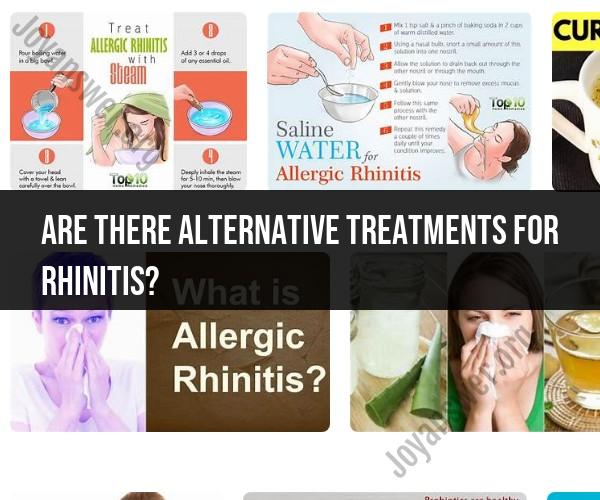Are there alternative treatments for rhinitis?
Yes, there are alternative and complementary treatments for rhinitis, which is an inflammation of the nasal passages that can cause symptoms such as a runny or stuffy nose, sneezing, and congestion. It's important to note that while these treatments may provide relief for some individuals, they may not be a substitute for medical advice or conventional treatments, especially in cases of severe or chronic rhinitis. Always consult with a healthcare professional before trying alternative treatments. Here are some alternative treatments that people with rhinitis may consider:
Saline Nasal Irrigation (Nasal Douche or Neti Pot): Rinsing the nasal passages with a saline solution can help reduce congestion and alleviate symptoms. It can help wash away irritants and allergens.
Herbal Remedies: Some herbal remedies, such as butterbur, quercetin, and bromelain, are believed to have anti-inflammatory and antihistamine properties that may provide relief from rhinitis symptoms. However, their effectiveness is not as well-established as conventional treatments.
Acupuncture: Acupuncture, a traditional Chinese medicine practice, involves inserting thin needles into specific points on the body to balance energy flow. Some people find relief from rhinitis symptoms through acupuncture.
Chiropractic Care: Chiropractic adjustments may help improve the overall function of the immune system and reduce inflammation. It's thought that chiropractic care could benefit individuals with rhinitis, but more research is needed to establish its effectiveness.
Homeopathic Remedies: Some people with rhinitis seek relief from homeopathic remedies, which use highly diluted substances to stimulate the body's natural healing processes. Common homeopathic remedies for rhinitis include Allium cepa, Natrum muriaticum, and others.
Dietary Modifications: Some individuals find that eliminating certain foods from their diet, such as dairy products or gluten, can reduce inflammation and improve rhinitis symptoms, especially if they have underlying food allergies.
Probiotics: Maintaining a healthy gut microbiome with the help of probiotics may have a positive impact on the immune system, potentially reducing the severity and frequency of rhinitis symptoms.
Essential Oils: Inhalation of essential oils like eucalyptus or peppermint may help clear nasal passages and provide temporary relief from congestion.
Yoga and Breathing Exercises: Practicing yoga and deep breathing exercises can help reduce stress and improve overall well-being, which may indirectly alleviate rhinitis symptoms.
Acupressure: Similar to acupuncture, acupressure involves applying pressure to specific points on the body. Some people find relief from rhinitis symptoms through acupressure techniques.
It's essential to consult with a healthcare professional or an integrative medicine practitioner before trying any alternative treatments, as individual responses to these methods can vary, and they may interact with conventional medications or have side effects. They can provide guidance on which alternative treatments may be safe and suitable for your specific condition. In some cases, a combination of alternative and conventional treatments may offer the best results for managing rhinitis.
Exploring Alternative Treatments for Rhinitis
Rhinitis is a common inflammation of the lining of the nose. It can be caused by allergies, infections, or other irritants. Symptoms of rhinitis include sneezing, runny or stuffy nose, and itchy eyes.
Conventional treatments for rhinitis include over-the-counter and prescription medications, such as antihistamines, decongestants, and corticosteroids. However, some people may prefer to explore alternative treatments for rhinitis.
Holistic Approaches to Managing Rhinitis Symptoms
Holistic approaches to managing rhinitis symptoms focus on addressing the root cause of the inflammation. This may include dietary changes, stress management techniques, and other lifestyle modifications.
Some common holistic approaches to managing rhinitis symptoms include:
- Eating a healthy diet: Eating a diet rich in fruits, vegetables, and whole grains can help to reduce inflammation and boost the immune system.
- Avoiding trigger foods: Some foods, such as dairy products, wheat, and soy, can trigger rhinitis symptoms in some people. Avoiding these foods may help to reduce symptoms.
- Managing stress: Stress can worsen rhinitis symptoms. Stress management techniques such as yoga, meditation, and breathing exercises can help to reduce stress and improve symptoms.
- Using saline nasal irrigation: Saline nasal irrigation involves rinsing the nasal passages with a saltwater solution. This can help to remove mucus and allergens from the nose and reduce symptoms.
Complementary Therapies for Rhinitis Relief
Complementary therapies are treatments that are used in conjunction with conventional medicine. Some complementary therapies that may be helpful for rhinitis relief include:
- Acupuncture: Acupuncture is a traditional Chinese medicine therapy that involves inserting thin needles into specific points on the body. Acupuncture is thought to help to reduce inflammation and improve immune function.
- Herbal supplements: Some herbal supplements, such as butterbur and stinging nettle, have been shown to be effective in reducing rhinitis symptoms. However, it is important to talk to your doctor before taking any herbal supplements, as they can interact with other medications.
- Homeopathy: Homeopathy is a system of alternative medicine that uses highly diluted substances to treat disease. Homeopathy is thought to work by stimulating the body's own healing response. There is some evidence that homeopathy may be effective in reducing rhinitis symptoms, but more research is needed.
Natural Remedies and Herbal Supplements for Rhinitis
In addition to the complementary therapies listed above, there are a number of natural remedies and herbal supplements that may be helpful for rhinitis relief. Some common natural remedies and herbal supplements for rhinitis include:
- Vitamin C: Vitamin C is an antioxidant that helps to boost the immune system. Some studies have shown that taking vitamin C supplements can help to reduce the severity of rhinitis symptoms.
- Quercetin: Quercetin is a flavonoid that has anti-inflammatory and antihistamine properties. Some studies have shown that taking quercetin supplements can help to reduce rhinitis symptoms.
- Butterbur: Butterbur is a plant that has been used for centuries to treat respiratory problems. Some studies have shown that taking butterbur supplements can be effective in reducing rhinitis symptoms.
- Stinging nettle: Stinging nettle is a plant that has anti-inflammatory and antihistamine properties. Some studies have shown that taking stinging nettle supplements can be effective in reducing rhinitis symptoms.
It is important to note that natural remedies and herbal supplements may interact with other medications you are taking. It is always best to talk to your doctor before taking any natural remedies or herbal supplements, especially if you have any underlying health conditions.
Integrative Medicine and the Future of Rhinitis Treatment
Integrative medicine is an approach to healthcare that combines conventional medicine with complementary and alternative medicine therapies. Integrative medicine practitioners believe that the best approach to healing is to address the whole person, including their physical, mental, and emotional health.
Integrative medicine is becoming increasingly popular as a way to treat rhinitis. Integrative medicine practitioners may use a variety of therapies, such as acupuncture, herbal supplements, and stress management techniques, to help their patients manage their rhinitis symptoms.
The future of rhinitis treatment is likely to involve a more integrative approach. As more research is done on the effectiveness of alternative therapies, integrative medicine practitioners will be better able to tailor treatment plans to the individual needs of their patients.












